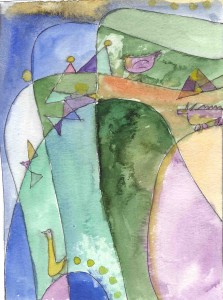What should children learn in school? and does the way we teach them achieve our goals? 
(LAK report to the teachers of New Bretten)
I know where I want to end up but don’t know how to get there. I am not sure I will recognize when I reach my goal or what it would look like when I get there.
The Director of the teaching program at Williams College, Susan Engel, wrote a clear and thoughtful overview of what constitutes useful learning activities for kids in elementary school (OP-ED article in the New York Times, February 2, 2010). The points she made were obvious but maybe not. I wonder what teachers, educational administrators and policy wonks make of what she had to say. Engel points out an important point that is often lost in schools. “….a basic percept of modern development science: developmental precursors don’t always resemble the skill to which they are leading.”She also notes that kids construct knowledge …”they don’t swallow it.”
We want children to be proficient in the standard mix of knowledge and skill including reading, writing, mathematics some history and social studies along with some exposure to art and music. Of course they also learn how to socialize effectively and to work alone and in groups. They are also given mandated standardized tests that are used to track what they have learned (and by implication they test the effectiveness of their curriculum and teachers).
To educate children successfully we must examine the components, underlying processes and sequential foundations of the skills and knowledge that we want them to acquire. Such an analysis would be an essential part of the development of curriculum. This component skill analysis would highlight the activities that children should be engaged in such as various format for developing thinking skills, use of evidence to support arguments, storytelling with lots of reading (and communicated what was read), writing about what is important and meaningful to them, spending time acquiring and practicing math skills and in science not just being passive but also learn to ask questions and develop experiments and learning to be active and skilled observers. As observers we want children to learn to be thoughtful, critical and active in trying to make sense of what they experience in all kinds of phenomena. We hope they will be able to think systematically, to organize evidence, to know how to ask questions.
I would add a few additional useful features of an effective elementary school curriculum. Children must develop executive functions that are readily put into use (such as planning functions, learning to delay gratification, skills that allow kids to self assess whether they know enough or have enough time to solve problem). They must be able to demonstrate conceptual (and not just mechanical) expertise in arithmetic, such as acquiring a sense of number, reading. They MUST become expert readers. An expert reader can extract information from what they read but an amateur reader will devote valuable cognitive capacity to the act of reading itself thereby limiting their ability to understand and absorb information read material. Likewise a child who is not expert at simple arithmetic and concepts of number will not be able to think mathematical about a problem.
What do we want kids to learn in school? We want kids to learn skills like reading, writing, and math but also how to think, solve problems, use their imagination in what they write. We want them to not only observers but thoughtful, critical observers of all kinds of phenomena. We hope they will be able to think systematically, to organize evidence, to know how to ask questions. We want them to know how to be part of a group, to learn and engage, and converse with other children in that group.
A cognitive science provides tools that allow us to break apart complex skills and uncover the processes that must be integrated to carry out functions like reading, calculation. Setting objective performance standards may have some value only if we ask ourselves how best to reach our educational goals. However the use of tools for understanding the basis of the cognitive operations that kids must learn is worthless without effective teachers. The first item that should be listed on the content list on a jar labeled ‘Current Education’ are gifted teachers. What is a good teacher worth? The answer is much more than class size, physical plant, pastel chalk or tinker toys. Research points to the fact that at the top of the list of what kids need to be successful learners are good teachers, teachers with energy, imagination, and commitment. In a recent study published in the journal Science good teachers make as much of difference as about $16,000.00 in family income (see article that is listed in Mindsinplay.com).